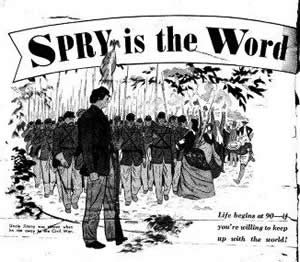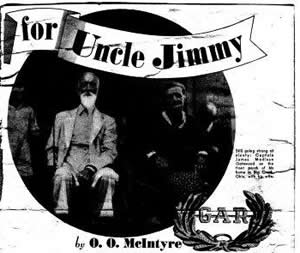Spry is the Word for Uncle Jimmy
By O.O. McIntyre
Transcribed and submitted by Marjorie Wood


When one is able at the age of ninety to be up and about at five A.M. and to take a lively interest in things, the best descriptive word is “spry.” Captain James Madison Gatewood is that sort of gentleman. Uncle Jimmy is my wife’s uncle, her mother’s brother, and a rare citizen of this land.
His captaincy grew out of his enlistment as a private when he ran away to the Civil War. For most of his ninety years he has lived on practically the same acres on which he was born. His address today is Big Creek, where he lives in a modern house up the holler a bit from a turn in the Ohio River.
There every evening while the sun is sinking you will find Uncle Jimmy on the front porch in his treasured rocker. He has watched thousands of sunsets but never tires of them. No one who knows him would think of approaching during his vesperal reverie. Always he seems lost in meditation while gently he rocks and gazes toward his beloved hills and the flowing river.
There are few problems in farming Uncle Jimmy has not solved and he believes that, honestly and industriously performed, tilling the soil offers the greatest freedom and content this side of heaven. He has had no boss save Mother Earth, and always he has found her tractable and productive.
Ten children were born to Uncle Jimmy and Aunt Maggie: six girls and four boys. All survive save Major, who died gallantly in France near the Belgian border.
Major was the apple of Uncle Jimmy’s eye, a blond young son with the love of the hills and streams. Uncle Jimmy’s heart seemed almost to crack when that laconic formal announcement came from the War Department in Washington: “Died in action--Major Gatewood…” For days he neglected his farm routine just to sit on his front porch, staring but seeing little through the constant mist. Sometime they would find him there as dawn brushed the sky.
He would not let them bring Major’s body home. Uncle Jimmy was a soldier and believed a soldier should be buried where he fell. A few years ago Aunt Maggie, in her seventies and making her first journey out of her township, crossed the ocean as a Gold Star mother to place a wreath on Major’s grave. Entwined in the wreath were some fronds of fern hand-picked by Uncle Jimmy from the cool glades where he and Major had so often strolled.
Upon nearing his ninetieth milestone, Uncle Jimmy began to make plans to embark alone on a sentimental journey. He wanted to visit Gettysburg. He pishtushed the rising alarms of his family that one of his age should make such a trip without companionship.
He wanted to see the country by easy stages, so he rode most of the way by bus. A retiring but courtly gentleman, he found everybody considerate along his route. He stood, he bared, where Lincoln stood to make his immortal address. He walked among the illustrious graves, many of which concealed all that was mortal of men he had known.
Uncle Jimmy is a notable product of self-education. His schooling ended at sixteen when he went off to war; before that it had been rather spasmodic, owing to the dearth of schoolhouses in those days. Yet despite this handicap, he is an educated man with a collegiate approach to all subjects. He knows exactly what is going on in Washington and not one of the statesmen fools him with political subtleties.
Uncle Jimmy is a prodigious reader. Today he reads from “kiver to kiver” Harper’s, Time, Cosmopolitan, the American Mercury, the Saturday Evening Post and the Nation, and so far as I know he is the only person in his entire section who is a subscriber to London Punch. He had read “Gone with the Wind” six weeks after publication. He knows more about the careers of Sinclair Lewis, Edith Wharton, Theodore Dreiser and other topnotchers than many bookworms.
While Uncle Jimmy is of the land and truly rural, the city is not unknown to him. After the war he accepted a clerical job on Governors Island at New York and he can talk intelligently of the days when Forty-second Street and Broadway were mostly cow pasturage and pigs ran in the street in front of the old Astor House. He also spent some time in Boston, Washington and Philadelphia, with side trips to Plymouth Rock and such, and is especially versed in the historic lore of New England.
I refer to Uncle Jimmy by the name his close relatives have used in discussing him with me. But only such intimates would think of calling him Uncle Jimmy. He is one of the old-school gentlemen, aloof, dignified and unbending. To his acquaintances and neighbors he is Captain Gatewood.
To me, one of the most admirable traits of the venerable gentleman is his habit of bridling his tongue. Rarely will he offer a word of criticism. When people are mentioned for whom he has no taste, his is the withering method of eloquent silence. He cannot be jockeyed into vituperation, no matter what his personal prejudices may be, and they are often pronounced.
A summer or so ago, two or three city men who had met Uncle Jimmy in town got out of their cars in passing to palaver a moment on his front porch. During the talk a personage much in the headlines was mentioned, and the visitors began to voice their enthusiasm.
Uncle Jimmy had nothing but righteous contempt for this fellow, but he listened, only a slight twitching of his fingers revealing his thoughts. Not once did he offer a remark, but when the panegyric concluded he inquired innocently: “A bit windy, isn’t he?”
Nothing could have shattered such a build-up more effectively. For that was exactly what the pseudo-hero was --a blowgun, spiked with rash and unfulfilled promises.
Uncle Jimmy comes from a long-lived family. His sister, Mrs. Emma Kerns, is eighty-five; she was the subject of a piece in Cosmopolitan by this writer several years ago called, “Aunt Emma in Hollywood.” Another sister, Mrs. Mullineaux, is seventy-eight’ still another, Mrs. Brading; is eighty. A brother, Edgar, is seventy, and another brother, Charles-known as Uncle Doc-is seventy-six.
Uncle Jimmy has no theories about longevity. He has never smoked but has chewed tobacco moderately since boyhood. He has never used alcohol to any extent.
He is a quiet but sincere religionist. He does not go to church much any more, but his well-thumbed Bible is opened several times a week for some readings of comforting passages and he mumbles a perfunctory grace at meals.
Uncle Jimmy has seen the old order yield to the new with perfect complacency. He has no fears for the future of America. To him the controversialists are merely “windy”--his pet term. He scoffs at the idea of a Communistic America. He has watched jingoists bob up, die down and disappear for almost a century and is indifferent to their alarms.
Finally, he does not believe there is a barrier to the continuity of life that cannot be hurdled by faith. And that is why, Uncle Jimmy, rocking on his front porch, faces even death itself with perfect equanimity.